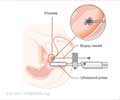
‘Genetic variations driving prostate cancer determine the composition of the immune cells and these in turn, dictate tumor progression and response to treatment.’
Tweet it Now
Genetic variations in prostate cancer"We observed that specific genetic events resulted in striking differences in the composition of immune cells present in and around the tumor - results with important therapeutic implications," said senior author Pier Paolo Pandolfi, MD, PhD, Director of the Cancer Center and Cancer Research Institute at BIDMC. "Our data may be especially relevant for tailoring immunological therapies and for identifying responsive-patient population."
The third leading cause of cancer-related death in U.S. men, prostate cancer, is linked to a number of diverse genetic mutations that drive the disease. For example, the loss of the tumor suppressor gene PTEN is a frequent event in prostate cancer and is well known to promote the disease in combinations with a plethora of other mutations. Researchers also know that the tumor’s microenvironment - the blood vessels, immune cells, signaling molecules and other factors that surround the tumor - plays an important role in tumor progression and response to therapy.
Mice models with human prostate cancer
Pandolfi’s team - including lead author, Marco Bezzi, a post-doctoral fellow in Pandolfi’s lab - engineered mice models to represent four distinct known genetic variations of human prostate cancer. The models lacked either Pten alone or in combination with other genetic alterations known to drive the disease. When the team analyzed the tumors from these mice, they saw profound differences in the types and relative numbers of the immune cells that had accumulated in and around the tumor, what they call the tumors’ "immune landscape".
Advertisement
The research team also demonstrated that these differences in immune cell composition were directly dictated by the tumors themselves because of their genetic variations. Different tumors, they observed, secreted distinct chemical attractants, which in turn recruited - or didn’t recruit, in the case of the immune-desert tumors - different immune cell types into the tumor. Pandolfi and colleagues further demonstrated that these differences hold true in human prostate cancer. Critically, the immune cells recruited to the tumors were found to be essential in supporting the growth and progression of these tumors.
Advertisement
Thus, because immune cells interact with and also affect tumor response to therapy, these findings may be especially relevant for the development of more precise and effective combinations of immunotherapies and targeted therapies on the basis of the cancer genetic makeup.
"These profound differences in immunological landscapes among various cancer genotypes further highlight the need to thoroughly investigate and integrate genotypes and immune-phenotypes in the context of exploratory cancer treatments in both preclinical and clinical settings," said Pandolfi.
Source-Eurekalert















